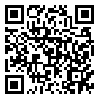Volume 6, Issue 16 (4-2011)
2011, 6(16): 95-118 |
Back to browse issues page
Download citation:
BibTeX | RIS | EndNote | Medlars | ProCite | Reference Manager | RefWorks
Send citation to:



BibTeX | RIS | EndNote | Medlars | ProCite | Reference Manager | RefWorks
Send citation to:
Sadeghi I, Khosravi A, Aghakhani Bizhani M. A Structural analysis of “Keiykavous Going to Mazandaran” Story. Journal title 2011; 6 (16) :95-118
URL: http://jls.khu.ac.ir/article-1-1795-en.html
URL: http://jls.khu.ac.ir/article-1-1795-en.html
1- Shahr-e Kord University , sadeghiesama@gmail.com
2- Esfahan University
3- Shahr-e Kord University
2- Esfahan University
3- Shahr-e Kord University
Abstract: (6903 Views)
The story of “ Keikavous Going to the Mazandaran” consists of three parts: the beginning, the middle and the ending. The story opens with an incident and introduces the main character (Rostam) to the reader. The story adopts a shortcut, which is the turning point of the story, and connects the introduction to the middle part. After the incident, events take place one after another and the story progresses on a linear sequence. In the middle of the story, the character is tested. The story has a chainlike sequence and the consequence of events culminates in the climax, which is the second turning point. By this point, the story goes to the end part and the character’s fate is clarified. Rostam, the hero, should travel from Sistan to Mazandaran to achieve his goal which is freeing Keikavous from the Devil’s prison. Zal has sent him on this mission. Finally, Rostam manages to pass through the difficult stages and complete his mission with the help the assisting forces; God, his horse “Rakhsh”, Owlad, and the obese sheep. The story is close – ended and follows strong cause and effect relationships and eventually closes with a definite result.
References
1. احمدی، بابک (1380) ساختار و تأویل متن. چاپ یازدهم. تهران: مرکز.
2. اخوت، احمد (1371) دستور زبان داستان. اصفهان: فردا.
3. اسکولز، رابرت (1383) درآمدی بر ساختارگرایی در ادبیات. ترجمه فرزانه طاهری. تهران: آگه.
4. اسکولز، رابرت (1377) عناصر داستان. ترجمه فرزانه طاهری. تهران: مرکز.
5. برجر، جان (1380) درباره نگریستن. ترجمه فیروزه مهاجر. تهران: آگاه.
6. پدیدههای انرژیزایی و ردیابی نشانههای روحزایی(1372) مرکز تحقیقات و مطالعات انرژییزایی و روحزایی، تهران: جم.
7. پراپ، ولادیمیر (1386) ریختشناسی قصههای پریان. ترجمه فریدون بدرهای. تهران: مرکز.
8. تودوروف، تزوتان (1382) بوطیقای ساختارگرا. ترجمه محمد نبوی. چاپ دوم. تهران: آگه.
9. داد، سیما (1383) فرهنگ اصطلاحات ادبی. چاپ دوم. تهران: مروارید.
10. سلدن، رامان (1372) راهنمای نظریه ادبی معاصر. ترجمه عباس مخبر. تهران: طرح نو.
11. صادقی، اسماعیل و محمود آقاخانی بیژنی (1390) «بررسی ساختاری داستان هفتخوان اسفندیار براساس نظریه کلود برمون»، کاخ بیگزند (همایش بینالمللی بزرگداشت حکیم ابوالقاسم فردوسی)، مجله دانشگاه سیستان و بلوچستان:1920 ـ 1933.
12. صفا، ذبیحالله (1374) حماسهسرایی در ایران. چاپ سوم. تهران: سخن.
13. غلام، محمد (1381) رمان تاریخی. تهران: چشمه.
14. فورستر، ادوارد مورگان (1386) جنبههای رمان. ترجمه ابراهیم یونسی. چاپ پنجم. تهران: نگاه.
15. فردوسی، ابوالقاسم (1370) شاهنامه. به تصحیح ژول مول. با مقدمه محمدامین ریاحی. چاپ دوم. تهران: سخن.
16. فیلد، سید (1388) راهنمای فیلمنامهنویسی. ترجمه عباس اکبری. تهران: ساقی.
17. میرعابدینی، حسن (1387) صدسال داستاننویسی در ایران. جلد اول. چاپ پنجم. تهران: چشمه.
18. مککی، رابرت (1387) داستان: ساختار، سبک و اصول فیلمنامهنویسی. ترجمه محمد گذرآبادی. تهران: هرمس.
19. میرصادقی، جمال (1385) عناصر داستان. چاپ چهارم. تهران: سخن.
20. میرصادقی، جمال (1386) ادبیات داستانی. چاپ چهارم. تهران: سخن.
21. مندنیپور، شهریار (1389) ارواح شهرزاد. چاپ سوم. تهران: ققنوس.
22. موسوی، سیدکاظم (1387) آئین جنگ در شاهنامه فردوسی. شهرکرد: دانشگاه شهرکرد.
23. نایت، دیمن (1388) خلق داستان کوتاه. ترجمه آراز بارسقیان. تهران: افراز.
24. یغمایی، اقبال (1384) زگفتار دهقان. تلخیص شاهنامه به نثر. تهران: توس.
25. یونسی، ابراهیم (1388) هنر داستاننویسی. چاپ دهم. تهران: نگاه.
Send email to the article author
| Rights and permissions | |
 | This work is licensed under a Creative Commons Attribution-NonCommercial 4.0 International License. |







